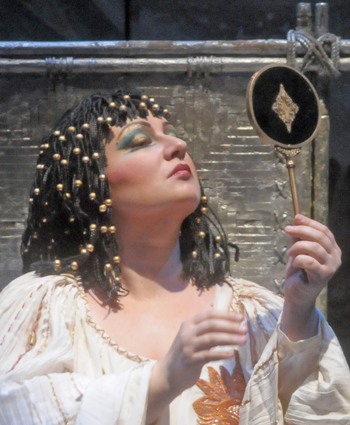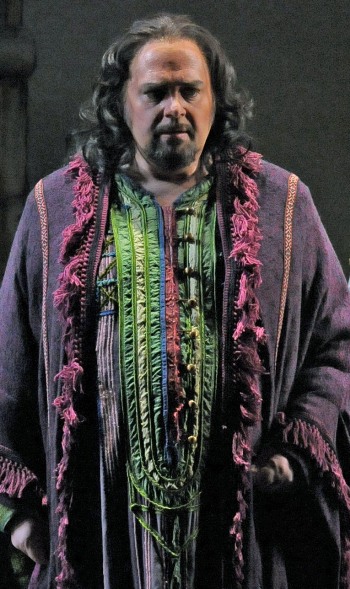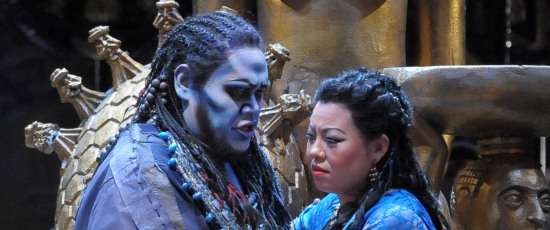Soprano Hui He takes over as Aida in Lyric’s new cast, and suddenly the chemistry bubbles
Review: “Aida” by Giuseppe Verdi, with late-run cast changes in five leading roles, at the Lyric Opera of Chicago through March 25. ****
By Nancy Malitz
It’s easy enough to decide whether a show is working for you. Whether it grabs you emotionally, makes you forget yourself, provides you with the sheer pleasure of witnessing something beautiful.
What’s not so easy is the why. Why it works, or doesn’t. So let’s admit the lure of a scientist’s petri dish in the chance to go back to the same show in the same house, within the space of a few weeks, with only a few parameters changed.
 The “Aida” now onstage at the Lyric Opera features the same orchestra, chorus, costumes, direction, sets and lighting as in the early run of the show. It has the same intelligent conductor in the pit (Renato Palumbo) and the same corps of ballet dancers, who are the stars of several lavish scenes.
The “Aida” now onstage at the Lyric Opera features the same orchestra, chorus, costumes, direction, sets and lighting as in the early run of the show. It has the same intelligent conductor in the pit (Renato Palumbo) and the same corps of ballet dancers, who are the stars of several lavish scenes.
Five new singing actors are now at work in the principal roles, and the chemistry has improved over the first cast, reviewed here. The high points are different, too. This time around the Ethiopian slave Aida’s tragic struggle to remain true to her love for Radames — an Egyptian war hero and thus technically her enemy — builds to a hair-raising pitch in the Act III showdown between Aida and her disapproving father.
He is Amonasro, Ethiopia’s king, newly arrived in chains incognito with other captured slaves. Determined on revenge, the king sets about systematically breaking his daughter’s resistance in gradations from gentle manipulation to brutal imperative, to the point at which she miserably agrees to beguile Radames of his war strategy.
It’s a credit to Chinese soprano Hui He and American baritone Quinn Kelsey that so much seemed at stake here. Their impassioned singing was crystal clear in its emotional intent as the advantage of argument swayed back and forth and back again.
Although the evening marked Hui He’s debut at the Lyric, she has sung Aida in many international houses including the Metropolitan Opera. Her signature arias, “Ritorna vincitor!” and “O patria mia,” are very fine achievements, but it takes nothing away to argue that her responsiveness in this ensemble is electrifying. And Quinn Kelsey, last seen at the Lyric in 2011 as the bullying brother Enrico in some performances of “Lucia di Lammermoor,” obviously knows his family dynamics.
The scene was vocally impressive and more; it had the cruel authority of dramatic truth throughout.
The other newcomers to the cast are Slovenian bass Štefan Kocán as the high priest Ramfis; Russian mezzo-soprano Anna Smirnova as Amneris, princess of Egypt and rival in love for Radames; and Italian tenor Marco Berti as the hero Radames.
 It’s a trio of big voices. Kocán’s bass is dark, with a distinctive edge that grabs the ear; he was an excellent addition to the ensemble as Egypt’s prime facilitator.
It’s a trio of big voices. Kocán’s bass is dark, with a distinctive edge that grabs the ear; he was an excellent addition to the ensemble as Egypt’s prime facilitator.
Smirnova has an ample, steely voice that suits the imperious princess Amneris at her angriest. Her top is promising indeed, but she had difficulty maneuvering through the full spectrum of pitch and volume, especially in the softer middle. The opening scene of Act II, set to languid music in Amneris’ apartment, requires the princess to lay her snare for Aida by casting a dreamy spell of feigned affection. Her subtle inquisition was beset be perplexing dropoffs in audibility, rather like a cellphone at lunchtime.
 Marco Berti has sung Radames to Hui He’s Aida many times. They recorded it together live for DVD with conductor Zubin Mehta at the Maggio Musicale in Florence in 2011, and they’ll do it together this summer at the Arena di Verona, a vast open-air amphitheater, and again in late 2012 at the Metropolitan Opera. Hers is a rich, soaring voice that is capable of great tenderness, lovely pianissimos and lingering, weightless effects to match well-nuanced acting. His is a forceful tenor with a baritonal glint, urgency and drive in the vibrato. As an actor by himself, he has a tendency to plant his feet and face forward, thinking about the high notes probably.
Marco Berti has sung Radames to Hui He’s Aida many times. They recorded it together live for DVD with conductor Zubin Mehta at the Maggio Musicale in Florence in 2011, and they’ll do it together this summer at the Arena di Verona, a vast open-air amphitheater, and again in late 2012 at the Metropolitan Opera. Hers is a rich, soaring voice that is capable of great tenderness, lovely pianissimos and lingering, weightless effects to match well-nuanced acting. His is a forceful tenor with a baritonal glint, urgency and drive in the vibrato. As an actor by himself, he has a tendency to plant his feet and face forward, thinking about the high notes probably.
But his scenes with Aida are something else entirely. They are a credible pair, comfortable together musically, quite touching dramatically in the final scene as they summon the peaceful resolve to bid farewell to life but not to love. Delicacy may not be the strength Berti leads with, but he showed essential warmth and spontaneity with his gifted Aida in this lovely duet, which conveys the experience of death for lovers as Verdi envisioned it — a long diminishing line that actually strengthens in potency, as their physical weakening dissolves into an entwined spiritual lift.
Related links:
- Wolf-gang! Wolf-gang!: Lyric Opera’s “Magic Flute” production to debut in Dallas Cowboys Stadium
- Lyric Opera’s 2012-13 season announced: List includes “Die Meistersinger” and “A Streetcar Named Desire”
- “Aida” performance location, dates and times: Check at theatreinchicago.com
Photo captions and credits: Lyric Opera’s March cast for “Aida.” Home page and top: Ethiopian King Amonasro (baritone Quinn Kelsey), now prisoner in Egypt, shames his daughter Aida (soprano Hui He) into betraying the man she loves. At left from top: Hui He as the slave Aida; mezzo-soprano Anna Smirnova as the princess Amneris; tenor Marco Berti as the warrior Radames. Below, the ballet corps dominates the Lyric Opera’s grand triumphal scene, in the Nicholas Joel production directed by Matthew Lata and designed by Pet Halmen. (All photos by Dan Rest.)
Tags: Aida, Hui He, Lyric Opera of Chicago, Marco Berti, Quinn Kelsey, Renato Palumbo, Stefan Kocan, Verdi













